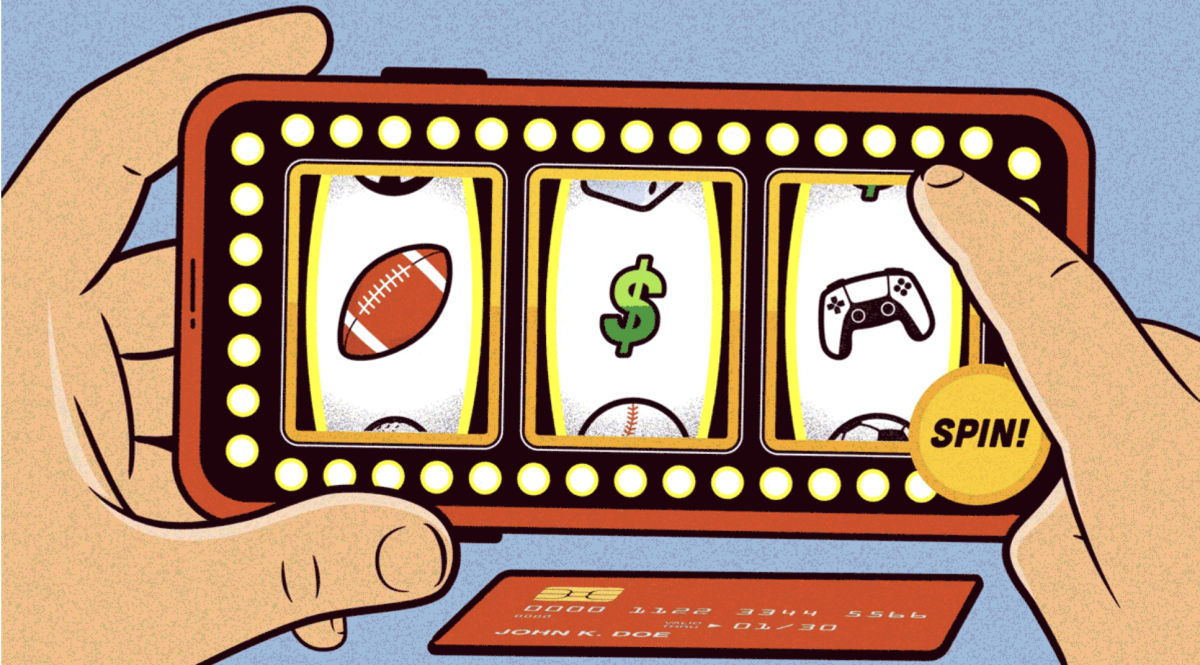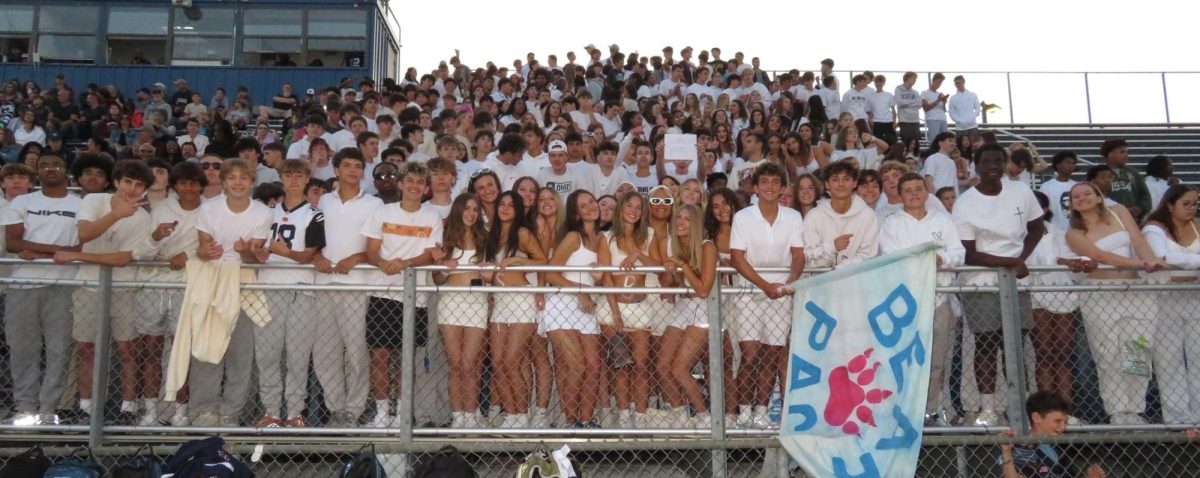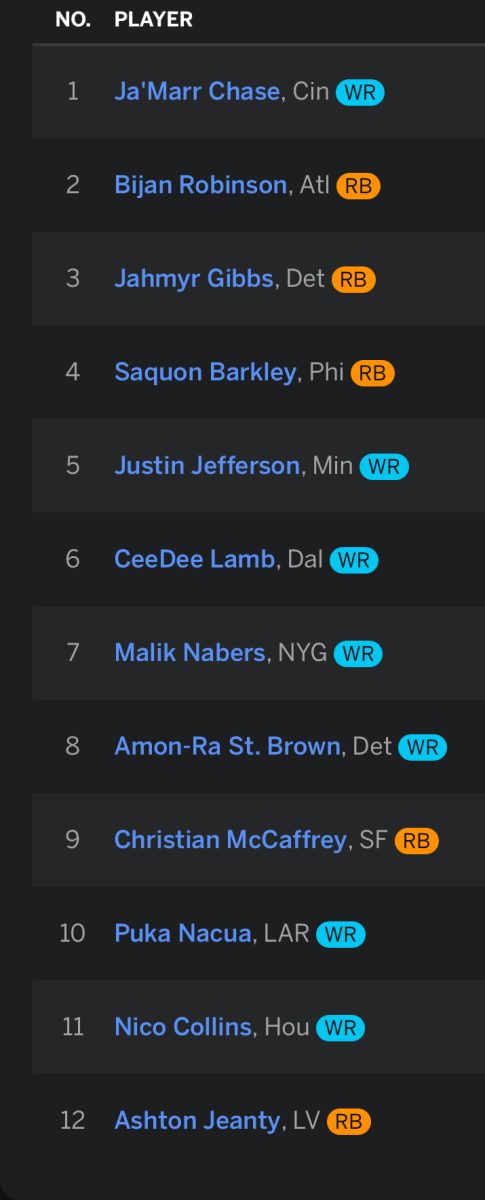For some students, sports betting is just another way to make a game more exciting. For others, it’s a routine, an everyday thrill with real money on the line. “I probably gamble five days a week,” one student admitted. Another student described the adrenaline rush of a big win: “I felt like I was ‘him’.”
Apps and websites like FanDuel, DraftKings, and BetMGM have made it easier than ever for people to place bets, even if they’re underage. In Michigan, the legal age for gambling is 21, but students still find ways to access betting apps, usually by using a family member’s or friend’s personal information. Whether they’re influenced by social media, advertisements, or just curiosity, the culture of betting is everywhere. Celebrities, influencers, and even athletes promote it, making gambling seem less like a risk and more like an exciting, normal part of sports.
But beneath the excitement lies a more complicated reality. While some students view gambling as a harmless thrill or a way to make watching sports more fun, others have experienced the darker side. Some students say they’re in control, while others have seen friends go down a worrisome path. “I’ve seen some people go down the hole of addiction,” one student gambler acknowledged. “It’s a scary thing.” Is this accessibility just another form of entertainment, or is it creating a gateway to financial problems, addiction, and/or riskier forms of betting? Through research and interviews with student gamblers, I’ll explore both sides of the question.
For many students, the excitement of sports betting comes from having money on the line. It makes watching a game feel more engaging. As Anonymous Gambler #1 put it, “You might be watching a random game, but having some pennies on it really makes it exciting.” Betting gives a sense of personal involvement in the game, turning a boring or irrelevant game into something that feels important. It also adds a thrill, like watching something you wouldn’t normally pay attention to. As Anonymous Gambler #2 said, referring to the lengths that betting can take him to, “Never in my life have I ever watched Chinese ping pong at 4am on a random Tuesday.” But now, because of betting, he has.
The rush of winning is hard to beat. Anonymous Gambler #2 described the thrill by saying, “When I hit a big win, it feels like the greatest thing in the world.” But the excitement can quickly turn into frustration. The temptation to bet more after a loss, hoping to recover, is always there, keeping the never-ending cycle of highs and lows going.
While betting makes sports more exciting for many students, it also has its downsides. Some gamblers find themselves uninterested in watching a game unless they have money on it. What starts as a fun way to engage with sports can turn into a dependency, where the thrill of betting outweighs the original love for the game. Anonymous Gambler #1 admitted that he follows all types of sports now he’ll bet on anything, even unheard-of competitions he wouldn’t normally know or care about.
When betting on almost anything, the financial risks can add up quickly. Some students believe they have control over their betting, but even small, consistent bets can lead to unexpected losses. Anonymous Gambler #1 described how a bad streak can urge him to double down in an attempt to recover, turning that minor loss into something much bigger. Anonymous Gambler #2 admitted that he used to gamble daily, sometimes betting as much as $20 per day, before realizing that he needed to cut back. Over time, the goal can shift from enjoying the game to chasing the next win, making it even harder to quit.
Financial problems aren’t the only effects that gambling can have. The psychological effects of gambling can take a serious toll on students. Anonymous gambler #2 talked about his friend who got “in too deep” and had to quit gambling altogether. Others develop a mindset where they see losing streaks as something they have to “grind through.” Even when students don’t see themselves as addicted, gambling can shape how they act and how they engage with sports and money.
The legal and ethical debate surrounding underage sports betting is also complicated, with age restrictions playing a central role in trying to protect kids and teens from the potential problems that come with gambling.
These age restrictions are meant to shield students from financial loss and addiction. However, gambling apps are so widely promoted that you have to ask, are these apps doing enough to prevent underage users from betting?
Multiple students said that the barriers are relatively easy to bypass, saying, “To have an account, you need a social security number and ID, but people just use their parents [information], and there’s no way for the apps to know who is really using the account.” This loophole allows students to easily get past the regulations, making people wonder if enough is being done to keep people who are underage from gambling.
There is also a deeper question being asked: if gambling is as dangerous as experts say, why is it so accessible to adults, and why is it so aggressively marketed? Betting advertisements are everywhere, with TV ads, huge billboards, social media ads, and celebrities endorsing gambling apps like FanDuel and DraftKings, making it seem glamorous and healthy. This marketing blurs a very important line between harmless fun and serious danger, suggesting that gambling is just another form of entertainment rather than a path to addiction. Despite the risks, it is still legal for adults to gamble, and there are no restrictions on the way that online betting is advertised.
The question of whether underage sports gambling should be entirely banned remains a difficult one for many. On one hand, the risks that come with gambling are undeniable. The potential for addiction and financial loss are serious problems that can harm students. Stories from student gamblers reveal how easily a casual bet can turn into a dangerous habit, draining their savings and affecting their daily lives. Anonymous Gambler #2 admitted, “I used to gamble a decent amount every day… before I decided I had to chill out after a few months.” If situations like these are allowed to continue, it could create serious addiction.
On the other hand, the thrill of betting and the excitement it brings are hard to ignore. For many students, it’s a form of entertainment that doesn’t seem harmful when given limits and moderation. As Anonymous Gambler #3 put it, “It’s fun, and I feel like I can control it.” The adrenaline rush of watching a game with money on the line and the excitement of a big win can make betting feel like just another part of the sports experience. Unlike drinking or smoking, which are usually social activities with direct health consequences, gambling is more about strategy, risk-taking, and personal decision-making. For many students, it’s less about rebellion and more about engagement with sports in a new way. Banning it could be taking away something that students genuinely enjoy. While most students acknowledge the risks, they also feel like they can control themselves. However, for those who can’t, the consequences can be extreme.
Although the potential harm is clear, the appeal is obvious too. The line between harmless fun and a serious problem is often blurry, and while banning underage gambling may seem like the solution, it’s nearly impossible to enforce. As long as students can access betting apps through family accounts, restrictions alone won’t stop them. Instead of relying solely on regulations, we need to focus on education. Students should fully understand the risks, how quickly losses can add up, and how easily gambling can become a habit. If gambling isn’t going away, the least we can do is ensure students know the risks before placing that bet.









